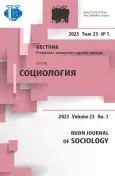Byzantine heritage in contemporary Turkey: Research features and political significance
- Authors: Belokonev S.Y.1,2, Ivanov V.G.2,3, Levina E.V.1,4
-
Affiliations:
- Financial University under the Government of the Russian Federation
- State University of Management
- RUDN University
- Market Economy Institute of RAS
- Issue: Vol 23, No 1 (2023)
- Pages: 89-99
- Section: Contemporary society: the urgent issues and prospects for development
- URL: https://journal-vniispk.ru/2313-2272/article/view/323033
- DOI: https://doi.org/10.22363/2313-2272-2023-23-1-89-99
- ID: 323033
Cite item
Full Text
Abstract
The article considers the politics of memory of the Turkish government in relation to the Byzantine heritage in the country and the reaction of the states whose historical narrative and identity are associated with the Byzantine Empire’s legacy. The article is based on a wide range of sources in Turkish, Greek, English and Russian. The authors believe that the Turkish policy of Islamization and the ideology of neo-Ottomanism, which are implemented by the ruling AK Party under the leadership of the President R.T. Erdogan, lead to the gradual dismantling of the remaining Byzantine heritage, which was proved by the transformation of the Monastery of the Choir and the Hagia Sophia into mosques. Turkish society, except for a few dissidents many of whom have already left the country, does not show interest in the history of Byzantium and perceives the policy of the ruling party quite pragmatically, according to the opinion polls. The international reaction to the decisions of the Turkish leadership was quite restrained and in general did not focus on Byzantium and its role in history. Thus, European politicians and researchers criticized mainly the anti-Western idea of Erdogan’s actions and rhetoric, while Greece fears mostly the revival of Ottoman imperialism and considers the Byzantine legacy as a part of Hellenism. The authors conclude that it was Russian society that defined the policy of Erdogan as the destruction of the Byzantine heritage of the Eastern Orthodox civilization (primarily due to the position of the Russian Orthodox Church), which made the Russian political leadership discuss this issue at the highest level. Moreover, in the international dimension, Ankara’s consistent policy to dismantle the Byzantine heritage affects the image and ideology of the Russian state to a greater extent than that of Greece, which is determined by the sustainable perception of Russia as the successor of the Byzantine tradition.
Keywords
About the authors
S. Yu. Belokonev
Financial University under the Government of the Russian Federation; State University of Management
Author for correspondence.
Email: syubelokonev@fa.ru
кандидат политических наук, научный руководитель факультета социальных наук и массовых коммуникаций Финансового университета при Правительстве Российской Федерации; профессор кафедры государственного и муниципального управления Государственного университета управления Leningradsky Prosp., 49, Moscow, 125468, Russia; Ryazansky Prosp., 99, Moscow, 109542, Russia
V. G. Ivanov
State University of Management; RUDN University
Email: ivanov_vg@pfur.ru
доктор политических наук, доцент кафедры государственного и муниципального управления Российского университета дружбы народов; профессор кафедры государственного и муниципального управления Государственного университета управления Ryazansky Prosp., 99, Moscow, 109542, Russia; Miklukho-Maklaya St., 6, Moscow, 117198, Russia
E. V. Levina
Financial University under the Government of the Russian Federation; Market Economy Institute of RAS
Email: elena.v.levina@gmail.com
кандидат социологических наук, старший научный сотрудник Института проблем рынка Российской академии наук; доцент департамента социологии факультета социальных наук и массовых коммуникаций Финансового университета при Правительстве Российской Федерации Leningradsky Prosp., 49, Moscow, 125468, Russia; Nakhimovsky Prosp., 47, Moscow, 117418, Russia
References
- Belyaev L.A. Khristianskie drevnosti: vvedenie v sravnitelnoe izuchenie [Christian Antiquities: Introduction to Comparative Studies]. Saint Petersburg; 2020. (In Russ.).
- Vasiliev A.A. Istorija vizantijskoj imperii [History of the Byzantine Empire]. Vol. 1. Moscow; 1998. (In Russ.).
- Veselov Yu.A. Reaktsiya mirovoy obshchestvennosti na vozvrashchenie Soboru Svyatoy Sofii statusa mecheti [Reaction of the world community to the return of the mosque status to the Hagia Sophia]. World Politics. 2022; 1. (In Russ.).
- Erkanian A. Turkey is no longer Turkey. Why did Erdogan rename his country? URL: https://ru.armeniasputnik.am/20211210/turtsiya---bolshe-ne-turtsiyapochemu-erdogan-pereimenoval-svoyu-stranu-36214389.html?ysclid=l88o1ogw ma565197609. (In Russ.).
- Svistunova I.A. Vizantiyskie issledovaniya v Turtsii: istoriya i sovremennost [Byzantine studies in Turkey: History and the present]. Journal of Cultural Studies. 2019; 3. (In Russ.)
- Shavrina M.S. Hagia Sophia v statuse mecheti: mezhdunarodnye otsenki i perspektivy funktsionirovaniya [Hagia Sophia in the mosque status: International assessments and prospects for functioning]. Islam in the Contemporary World. 2020; 3. (In Russ.).
- Akyürek E. Byzantine art history in modern Turkey. Perceptions of the Past in the Turkish Republic: Classical and Byzantine Periods. Leuven - Paris - Walpole; 2010.
- Akyürek E. Byzantine art history in Turkey from the 1950s to the present. (L. Bevilacqua, G. Gasbarri (Eds.). Picturing a Lost Empire: An Italian Lens on Byzantine Art in Anatolia, 1960-2000. Istanbul; 2018.
- Aslan F. Ayasofya efsanelerine kaynak olması bakımından eski harflı Türkçe yazmalar. Ayasofya Müzesi Yıllığı. 2010; 13.
- Başaran E. Prof. Olivier Roy: Erdoğan zihinleri İslamileştiremediği için taşları İslamileştiriyor. URL: https://www.gazeteduvar.com.tr/politika/2020/07/21/prof-olivier-roy-erdogan-zihinleri-islamilestiremedigi-icin-taslari-islamilestiriyor.
- Bekdil B. Turkey: Erdogan wishes “many more happy conquests”. URL: https://www. gatestoneinstitute.org/16092/turkey-erdogan-conquests.
- Ivanov V.G. The problems of assessing validity and political potential of cross-national comparative ratings. Comparative Politics Russia. 2021; 1.
- Korenevskiy A.V. Russia’s Byzantine heritage: The anatomy of myth. New Past. 2016; 1.
- Melakopides C. Multi-vector management of soft power policies: Will Russian soft power be victimized by the Moscow-Erdogan association? RUDN Journal of Public Administration. 2020; 7 (4).
- Serin U. Byzantium early Islam and Byzantine cultural heritage in Turkey. P. Atzaka, C. Papakyriakou, A. Pliota (Eds.). Byzantium Early Islam. Cultural Heritage Management: Shared Experience beyond Boundaries. Thessaloniki; 2008.
- Tuğal С. Turkey at the crossroads? New Left Review. 2021; 127.
- Yıldız Ş.K. A review of Byzantine studies and architectural historiography in Turkey today. Middle East Technical University: Journal of Faculty of Architecture. 2011; 2.
Supplementary files









